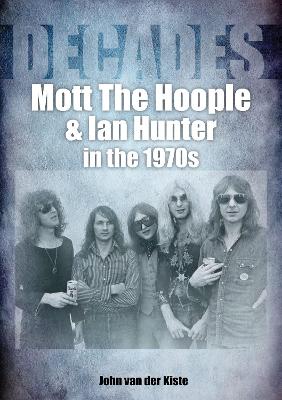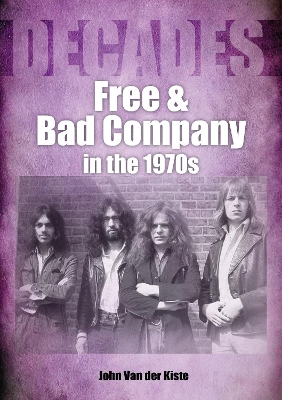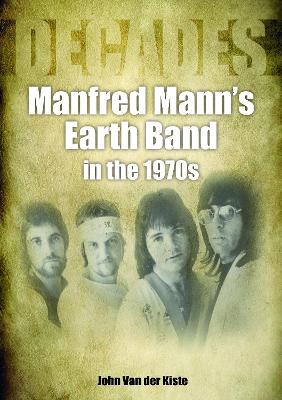Decades
3 total works
Mott The Hoople and Ian Hunter in the 1970s (Decades)
by John Van der Kiste
Published 11 February 2022
When Hereford group Silence teamed up with songwriter Ian Hunter in 1969 to form a group that aimed to be a cross between Bob Dylan, the Rolling Stones and Procol Harum, they rapidly became one of Britain's most popular live acts, but a major hit single and album initially proved elusive.
In 1972, disillusioned and exhausted, they split before being encouraged to reform by David Bowie and finding immediate chart success with a song he gave them, 'All the Young Dudes'. After two years of hits and internal conflicts Ian left and enjoyed a chequered solo career that has lasted to this day, initially in partnership with guitarist Mick Ronson until his death in 1993. The rest of the group subsequently shortened their name to Mott and then British Lions, the latter a collaboration with former Medicine Head front man John Fiddler, although they failed to re-establish themselves despite several solid months of touring on both sides of the Atlantic.
As Ian wrote, 'Rock'n'roll's a loser's game'. They won, they lost, but during the 1970s released some inspired, highly individual music, that went on to inspire and be championed by several other acts, notably Queen, the Clash and Def Leppard.
In 1972, disillusioned and exhausted, they split before being encouraged to reform by David Bowie and finding immediate chart success with a song he gave them, 'All the Young Dudes'. After two years of hits and internal conflicts Ian left and enjoyed a chequered solo career that has lasted to this day, initially in partnership with guitarist Mick Ronson until his death in 1993. The rest of the group subsequently shortened their name to Mott and then British Lions, the latter a collaboration with former Medicine Head front man John Fiddler, although they failed to re-establish themselves despite several solid months of touring on both sides of the Atlantic.
As Ian wrote, 'Rock'n'roll's a loser's game'. They won, they lost, but during the 1970s released some inspired, highly individual music, that went on to inspire and be championed by several other acts, notably Queen, the Clash and Def Leppard.
Free were formed in 1968 towards the end of the British blues boom. After two critically acclaimed albums, the release of ‘All Right Now’ and the album Fire and Water in 1970 brought them major success. Musical and personal differences took their toll and they split after the comparative failure of their next album and single. After starting new bands that never took off they reformed, but following further dissension and guitarist Paul Kossoff’s drug problems they disbanded for good in 1973.
Vocalist Paul Rodgers and drummer Simon Kirke then formed Bad Company, who became one of the hottest bands on both sides of the Atlantic, maintaining a stable line-up with ex-Mott The Hoople guitarist Mick Ralphs and ex-King Crimson bassist Boz Burrell for the rest of the decade. Each member later pursued outside ventures, although they regrouped at intervals, recruiting new members after Ralphs’ retirement and Burrell’s death. This book examines both bands’ work and career from 1968 to 1980, plus the Kossoff, Kirke, Tetsu, Rabbit album, Kossoff’s solo work and Back Street Crawler, with a chapter on their later history, notably Rodgers’ three years with Queen.
Vocalist Paul Rodgers and drummer Simon Kirke then formed Bad Company, who became one of the hottest bands on both sides of the Atlantic, maintaining a stable line-up with ex-Mott The Hoople guitarist Mick Ralphs and ex-King Crimson bassist Boz Burrell for the rest of the decade. Each member later pursued outside ventures, although they regrouped at intervals, recruiting new members after Ralphs’ retirement and Burrell’s death. This book examines both bands’ work and career from 1968 to 1980, plus the Kossoff, Kirke, Tetsu, Rabbit album, Kossoff’s solo work and Back Street Crawler, with a chapter on their later history, notably Rodgers’ three years with Queen.
Having moved from jazz, Blues and R’n’B to out-and-out pop in his various 1960s bands, keyboard player Manfred Mann went back to the drawing board in 1971 with a new quartet, Manfred Mann's Earth Band, and the intention of focusing on progressive rock.
With a repertoire that leant partly on radical rearrangements of songs by Bob Dylan and then Bruce Springsteen, largely instrumental epics that borrowed from Gustav Holst’s The Planets suite, and improvisations based around the interplay between Manfred’s newly-acquired moog synthesiser and the lead guitar of Mick Rogers, who left in 1975 but later returned, they soon built up a formidable live reputation throughout much of Europe (particularly in Germany) and America.
Apart from the Holst-inspired ‘Joybringer’, a top ten hit in 1973, British success was slow in coming, until a cover version of Springsteen's ‘Blinded by the Light‘ and its parent album The Roaring Silence three years later took their status to a new level on both sides of the Atlantic. This book examines the nine albums, fluctuating fortunes and various line-up changes from what was to be their best and most prolific decade.
With a repertoire that leant partly on radical rearrangements of songs by Bob Dylan and then Bruce Springsteen, largely instrumental epics that borrowed from Gustav Holst’s The Planets suite, and improvisations based around the interplay between Manfred’s newly-acquired moog synthesiser and the lead guitar of Mick Rogers, who left in 1975 but later returned, they soon built up a formidable live reputation throughout much of Europe (particularly in Germany) and America.
Apart from the Holst-inspired ‘Joybringer’, a top ten hit in 1973, British success was slow in coming, until a cover version of Springsteen's ‘Blinded by the Light‘ and its parent album The Roaring Silence three years later took their status to a new level on both sides of the Atlantic. This book examines the nine albums, fluctuating fortunes and various line-up changes from what was to be their best and most prolific decade.


